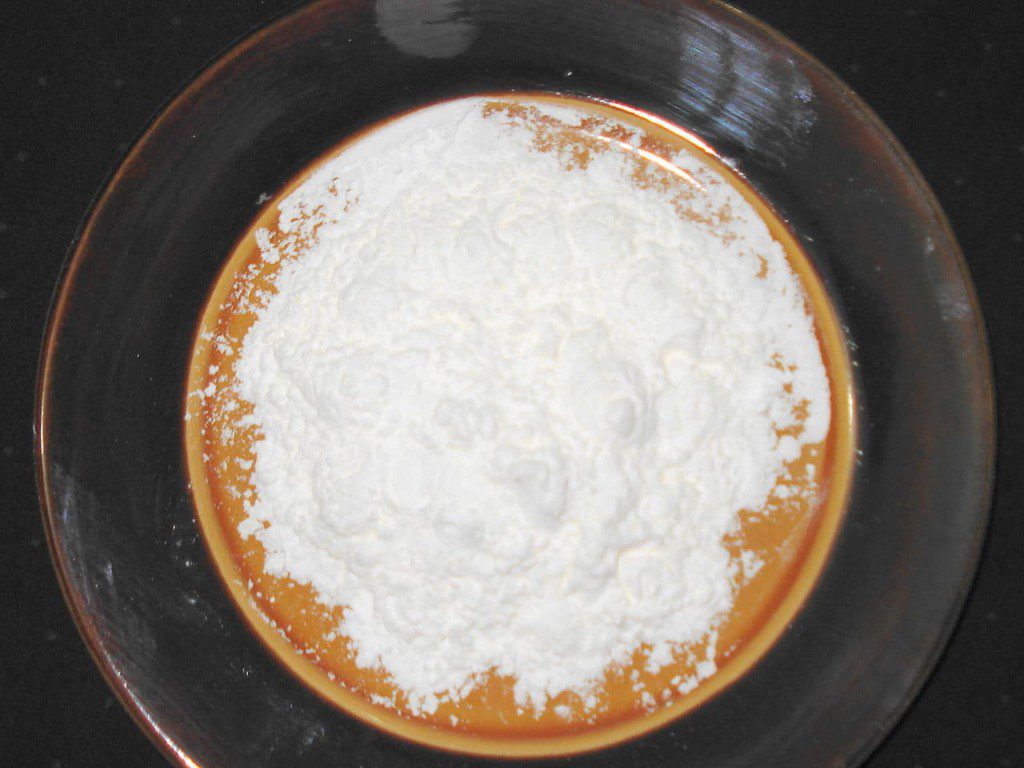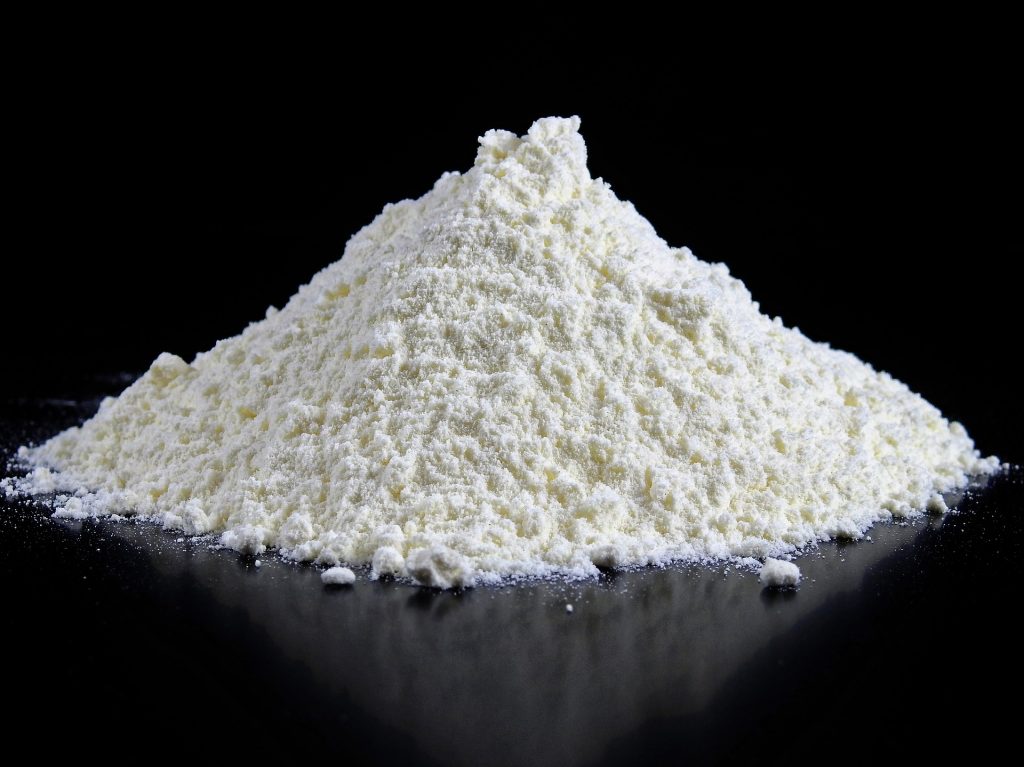
Image Credit: Wikimedia Commons
2. Tapioca Flour/Starch
Tapioca Flour comes from the same tuber from which arrowroot comes. It is a gluten-free arrowroot starch substitute and works well at high temperature just like cornstarch. But you have to be very cautious while using it as excessive tapioca starch in food can make it chewy and a bit sweet. Often arrowroot starch is used to replace the eggs to bind the food. Do you know that tapioca starch is a better binding agent than the arrowroot? If you are making a creamy or dairy-based sauce, tapioca is the best option; however, if you are making acidic liquids or sauces, it might not work well. Tapioca starch, when frozen, changes into an odd texture or gets coagulate when you are batch cooking while arrowroot starch freezes very well. Other than this, tapioca starch is equally rich in nutrients.
3. Potato Starch/Flakes
If we see the potato starch as a
thickening agent, it works similarly to arrowroot starch but in terms of
nutrition, it fails. When added to the sauce, it gives a cloudy texture similar
to cornstarch. If you are trying to give a shape to your food like bread or
muffin, then, potato starch is a great arrowroot
starch substitute. It is light and absorbs the moisture of the food in such
a way that your food’s moisture remains intact.
4. Sweet Rice Flour
Talking about the similarity between the two, sweet rice flour and arrowroot both gluten-free, however, when it comes to being who is starchier then sweet rice flour wins the race. Sweet rice flour is a good arrowroot starch substitute as just like arrowroot starch, it is a great option to prepare cool desserts or doing batch cooking. Apart from sweet rice flour, standard rice flour can also be used as a substitute for arrowroot starch but it will act like a common flour rather than starch for thickening the batter. While using sweet rice flour you have to be very careful as it should be mixed appropriately with adding equal parts of water or liquid into it before you add the sweet rice flour into the sauce. Also, make sure that lumps do not form in the batter. Just like potato starch, it gives a cloudy look to the batter.
5. Cream of Tartar
Cream of Tartar can prove to be a great arrowroot starch substitute as it is as useful as arrowroot starch to add volume and/or body to the dessert. Beware when you substitute the cream of tartar with arrowroot starch as their stabilizing power differs.
6. Xanthan Gum
Xanthan Gum is a perfect arrowroot starch substitute when you are looking for a binding agent. It provides similar results but works variably from the arrowroot starch. If you want to replace 1 egg, then you can add 2 tablespoons of arrowroot starch or 2 tablespoons of xanthan gum. It is easier to substitute the arrowroot as starch but for binding or stabilizing, it is difficult to find a substitute, more when arrowroot starch is itself substituting egg in a batter. It is made by natural fermentation and is gluten-free and 100% vegan.
7. Arrowroot Flour
Many people use it as an arrowroot starch substitute while cooking. It is mostly used on the Paleo diet where people don’t like wheat. Though it is called as flour, however, it is used as starch in food. As a thickening agent, it works great and can be replaced for seed flours or tapioca starch in equal measurements.
8. Wheat Flour
It is one of the best arrowroot starch substitute in terms of thickening agents. But if you are cooking a gluten-free dish, you should avoid wheat flour. While using the wheat flour as a thickening agent, it is mixed with butter. To get a proper roux, it is cooked slowly for a few minutes and added later to the dish.

9. Kuzu
It is Japanese arrowroot which is an extremely high thickening agent. When added to the sauce, it provides a smooth texture and gloss. It also provides the extra body to your food without damaging the flavor. Like some of the other substitutes, it does not give a starchy effect to the sauce which makes it one of the best arrowroot starch substitute. It is a great option to use in sweet food as it aids in maintaining the acidity of the food. It can be difficult to find it and comes at a very expensive price but it will be worth it once you try it.
Arrowroot Starch Substitute For Personal Care
As mentioned earlier, arrowroot starch is used for oral
health hygiene, skin and hair care, and even used in deodorants. If you can’t
use arrowroot starch for any reason, there are many arrowroot starch substitute that you can try.
Oral Care – In the mouth, arrowroot starch is used to sustain the pH balance while in teeth; it is used to mineralize them again. Very few know that just like a broken bone, teeth can be also be cured by having adequate minerals. An arrowroot starch substitute for oral hygiene is food grade diatomaceous earth. It is not fruity like arrowroot starch but it can give proper minerals to your teeth just like arrowroot starch. Apart from that, it can also guard your enamel and the gums.
Skin Care – The arrowroot starch has a good habit of absorbing all the oil on your skin that can give you breakouts or irritations. It can also be used to calm the minor irritations, maintaining the pH balance, and exfoliate the skin. It is often used to substitute the talc in cosmetics. An arrowroot starch substitute for skincare can be baking soda which works the same as arrowroot starch. The only issue is that it does not smell as good as arrowroot starch.
Deodorant – The best arrowroot starch substitute for making your deodorant is cornstarch which works in an equal way and gives a nice output. There are many other substitutes but you have to take a look at the formula to get the appropriate steadiness.
Dry Shampoo – The best arrowroot starch substitute for dry shampoo is the same as deodorant – cornstarch. Cornstarch will absorb all the oil from the scalp and give a silky smooth finish to your hair. You can use different other substitutes like food grade diatomaceous earth or baking soda but their performance will differ from arrowroot starch and you will have to do the hard work to find out the right formula which will be unique to you by doing multiple trials. If you have lice, then you can try diatomaceous earth which will kill the lice and their eggs as well without affecting the scalp.
FAQs About Arrowroot Starch Substitute
Many questions make us confuse about the arrowroot starch. A few of the most common questions being asked are discussed below:
-
Is arrowroot starch substitute keto friendly?
Though arrowroot starch does not contain any gluten or grain and is 100% natural, it does contain 16g of carbohydrate per cup of arrowroot starch. You won’t be using that much for single serving size, so yes, and arrowroot starch is keto friendly but not carbohydrate-free.
-
Can arrowroot starch substitute feed to babies?
Of course, why not? Usually, arrowroot cookies are given to babies who are teething. You can use it in your baby food as a substitute for less nutritional thickeners. It will give consistency to the food and also aid your baby if s/he has any digestive issue. Newborns who suffer from diarrhea, and arrowroot starch can be very helpful. However, you should be very cautious while giving the amount of arrowroot starch to your baby as high quantity can lead to constipation in them. Consult a paediatrician before giving anything to a small child.
-
Are arrowroot biscuits healthy?
You should give yourself a treat by eating these crunchy and luscious arrowroot biscuits only after the dinner because they help in the digestion process. Though these delicious biscuits are rich in iron, potassium, and B vitamins, still they are a cookie and should not be substituted for healthy food.
Conclusion
Overall, if we see, arrowroot starch substitute is a good option to add in your favorite food as it offers various benefits from cooking to maintaining the hygiene of oral, hair, skin, etc. Talking about the arrowroot starch substitute, there are many substitutes that have the same traits as arrowroot starch while some differ for many reasons. Did you know earlier that arrowroot is useful in maintaining hygiene too? Well, now you know. Try using them and share your valuable feedback.




